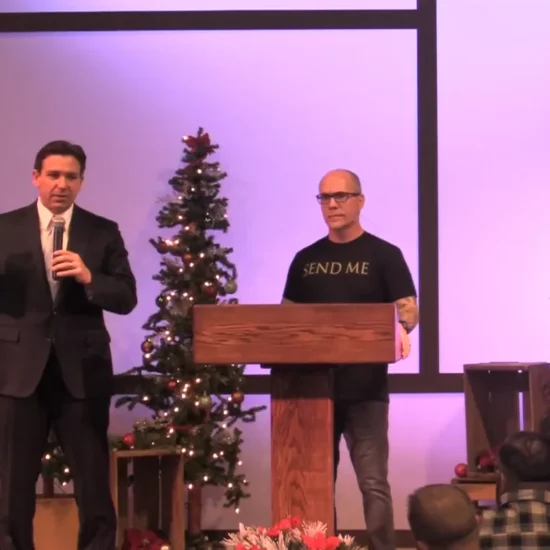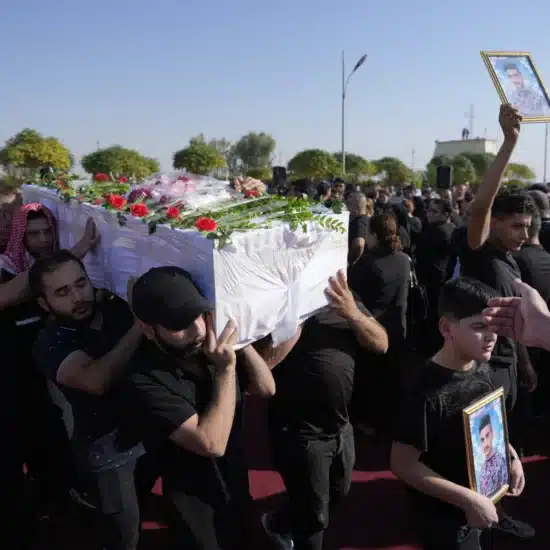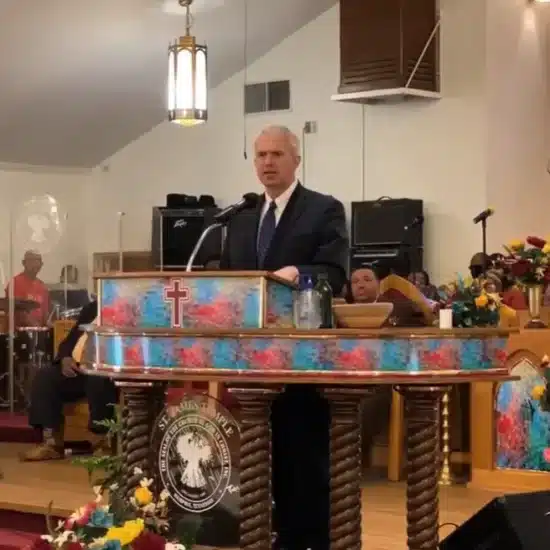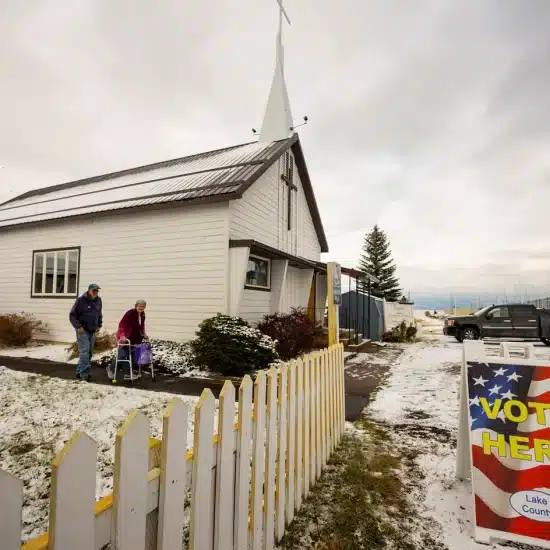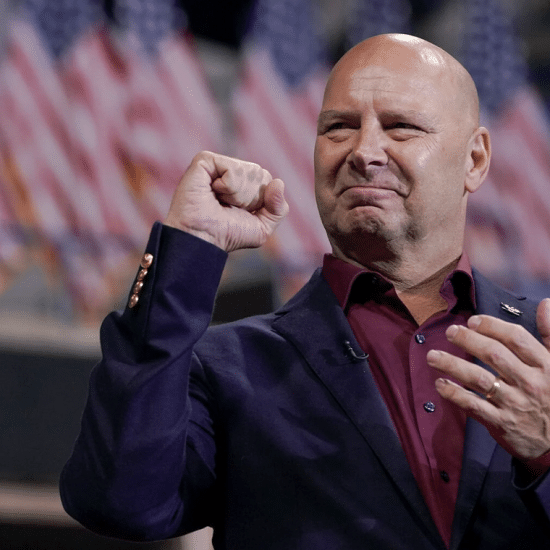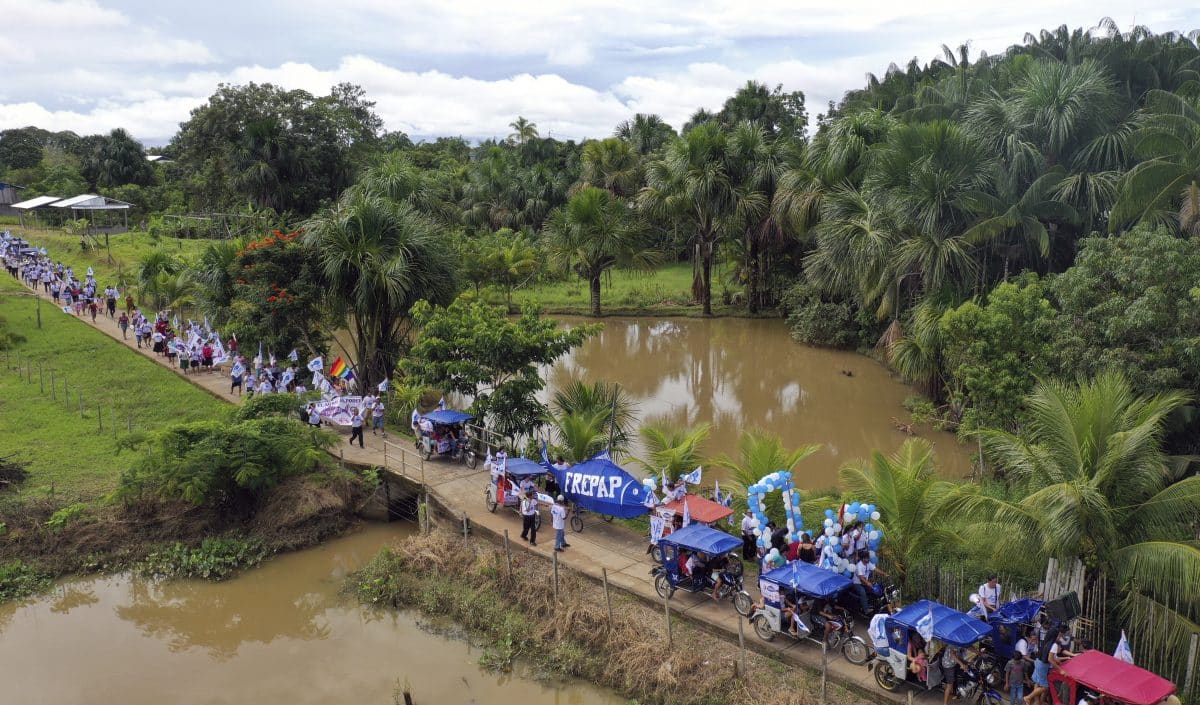
JOSE CARLOS MARIATEGUI, Peru (AP) — On the banks of the Amazon River, in a village without electricity or drinking water, Andrea Rodrigo makes the yuca flour that her family sells in markets along Peru’s remote borders with Brazil and Colombia. The 21-year-old Peruvian woman and seven of her neighbors recently paddled for half an hour down the vast river to two Indigenous communities where they put up posters for their political party, the Agricultural People’s Front of Peru.
Known as Frepap, it is the political arm of a messianic religious group called the Israelites of the New Universal Pact, which merges Old Testament Christianity with Andean culture. Adherents believe their leader, Jonás Ataucusi Molina, is the reincarnation of Jesus Christ and the Amazon is the promised land or the “land without evil,” leading the faithful to populate remote forests bordering Brazil, Colombia, Ecuador and Bolivia.
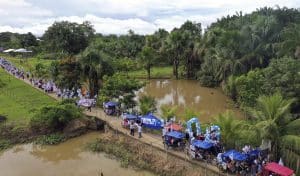
Supporters of the Agricultural People’s Front of Peru political party, known by its acronym Frepap, take part in an election campaign caravan in San Pablo, Peru, on March 30, 2021. (Rodrigo Abd/Associated Press)
Amid widespread disgust with traditional politicians and an extremely fragmented electorate, Frepap has emerged as a potential favorite in legislative elections Sunday (April 11), when Peruvians will also cast ballots for president. Observers say its surprising growth as a political force has to do with the roots it has put down and the proselytizing it has done in remote communities and poor neighborhoods, as well as weariness with seemingly endless corruption scandals among the establishment parties.
All of Peru’s former presidents since 1985 have been accused of corruption, with some imprisoned or arrested in their mansions and one taking his own life before police could capture him. Despite being prosecuted, one is currently running for president and another is seeking a seat in parliament. In the last 12 years, 57 former governors and 2,002 ex-mayors have been prosecuted or are fugitives. An official audit in 2019 found that corruption was consuming $17 million a day in Peru, enough to feed the country’s poor.
“I would like to see more members of Congress from Frepap, teaching people not to steal,” Rodrigo said as she adjusted her hair covering. Hanging on the wall of her hut was a painting of a blue fish, the symbol of the party created in 1989 by the late shoemaker Ezequiel Ataucusi Gamonal, founder of the religious movement and father of its current leader.
In a January 2020 special election called after President Martin Vizcarra dissolved congress, Frepap stunned prognosticators by winning 15 of 130 seats to become the third largest bloc in the country’s fragmented legislature.
In the year since, Frepap has maintained its image as “separated from the scandals … and without attitudes that reflect religious fanaticism or radical conservatism,” said anthropologist Carlos Ráez, who has studied the party.
Polls suggest no single party may win even 10% of the legislative vote Sunday, and analysts say Frepap’s clean image and backing in distant or impoverished communities far away from media and pollsters could produce another electoral surprise. Almost one third of voters are undecided.
Frepap candidates appeal to voters with promises to fight for agricultural development, oppose corruption and defend the rights of the poor. They are staunch religious conservatives, opposing abortion and same-sex marriage.
On a recent day, Milca Copa, a teacher in a town near Rodrigo’s village, was one of three Frepap candidates who crossed the Amazon with a message for voters: She was one of them.
“I have walked in the mud, I have lived without water, without electricity, without internet,” Copa told supporters.
“Frepap does not come one day and leave,” she added, to applause and chants. “We live here.”
For more than 30 years, Israelite communities have popped up in the Amazon as the faithful migrated there from the Andes or desert areas along the Pacific, obeying their founder’s call to populate the rainforest. Many of the faithful live in Mariscal Ramon Castilla province, a forested area larger than Belgium and divided by the Amazon River near Colombia and Brazil.
The first people to join the Israelites of the New Universal Pact were poor Andean migrants, sometimes sick or orphaned, who had no contacts in the cities, experts say.
“They were drawn to the movement because it offered them a way to survive in communities, in agriculture,” said Juan Ossio, a professor of anthropology at Peru’s Pontifical Catholic University who has written a book about the Israelites.
Frepap’s political opponents say its members are united but also impenetrable, and express concerns about the messianic group’s rise on the political stage.
“They are very hard-working, very united, but very closed,” said Julio Tuesta, the Popular Action party mayor of San Jose de Cochiquinas, a village on the banks of the Amazon. “What makes me doubtful is that they mix religion and politics. What will it be like when they have more power?”
But Pablo Rodrigo, Andrea’s father, said the group’s political gains have won their people respect.
In the hamlet of Jose Carlos Mariategui, he and his neighbors grow rice, lettuce, coriander, tomatoes, cucumbers, pineapples, papayas and yucas. Several months ago he bought an electrical generator and a computer to draft community agreements.
“God says if you work, you will be flooded with bread,” Pablo Rodrigo said. “But if you are idle, you will be poor.”
It’s a humble but honorable life, he added: “We don’t drink, we don’t smoke, we live in peace.”


